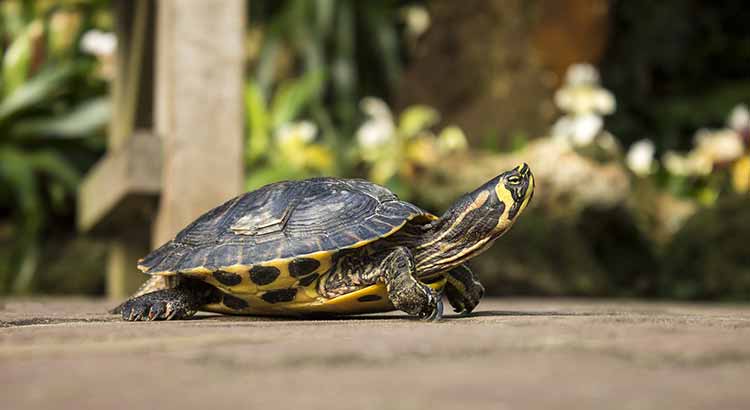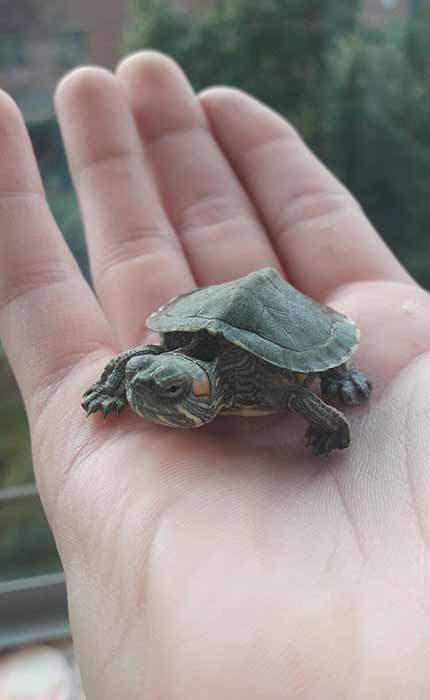Everybody knows that turtles are very slow, but what most people don’t know is why turtles are so slow. While the obvious reason is the shell, there is actually a lot more to it than that.
Most turtles move so slow due to their inflexible shell, which makes it hard for them to move at high speeds. On average most turtles, a turtle moves at a speed of 2 MPH (3.2 km/h) and swims at a speed of 10 MPH (16km/h).
During my research, I found out that while quite a few turtles are indeed slow, some of them can be quite fast, and there are a few turtles out there that can reach speeds that would surpass most cars. But before we take a look at those turtles, let’s take a closer look at why turtles are so slow.
Why Turtles Are So Slow? (It’s Not the Shell)
While the shell seems to be the main reason why turtles move so slow, tit’s actually not, the shell is simply a consequence of the main reasons, which are survival and evolution.
Basically, turtles are so slow because they don’t need to chase prey in order to eat, and they have enough protection that they don’t need to run away from predators.
Running means using up more energy, which means that they need to eat more, which means more running, and the cycle goes on. Turtles instead opted to use less energy and eat less, so the speed is not really important to them.
In their habitats, they have access to a lot of plants that they can eat and they don’t have to chase around prey too much because they can catch a lot of insects and other small types of prey without too much effort.
Also, the rate of their metabolism is very slow, and metabolism is also one of the main factors that determine the speed of an animal
So overall turtles aren’t faster because they don’t need to be. The thing that makes it physically harder for them to run, like the shape of their body, or their shell evolved this way due to the simple fact that they don’t need to run.
Can Turtles Run?
So turtles are slow, but most animals are able to run if they need to, can turtles run? Yes, they can. For example, when a groper tortoise is threatened by an approaching person it will start moving at speeds of several miles per hour which is a high speed compared to its usual slow pace.
Cooter and slider turtles also sprint rapidly toward the water if they are startled while on land.
Here is a video compilation of turtles running:
As you can see turtles can be fast, but what will really surprise is the fact that some turtles are so fast that they can go faster than most cars on the road.
The Fastest Turtle in the World (150 MPH)
Deciding which is the fastest turtle in the world can be a little tricky because there are a lot of moments when turtles can reach impressive speeds (and not just for a turtle). A snapping turtle can reach the speed of 174 MPH (280 km/h) when it’s striking. At this speed, it can keep up with an average NASCAR car. But this speed is only maintained for small periods, well under a second. But should this count?
Another problem is that turtles tend to leave both on land and underwater. And the speed that they can reach underwater doesn’t even compare with the one that they reach on land.
So I decided to split this part into 3 parts, fastest turtle on land, fastest turtle in the water, and special mentions. So let’s start with the first one.
The Fastest Turtle on Land
The fastest turtle on land is the softshell turtle which can reach up to 3 MPH (4.8 km/h).
Here is a picture of the speedster:
The main reason why this turtle is faster than the rest is the soft shell. Most turtles have their shells covered with bony scales, which add up a lot of weight, but the shell of the softshell turtle is covered with leather-like skin, which is considerably lighter.
The Fastest Turtle in the Water
While turtles aren’t able to reach impressive speeds on land, while they are in the water they are quite fast.
This category is dominated by sea turtles. There are only 7 species of sea turtles in the world and all of them are quite fast, the fastest of which is the Leatherback Sea turtle which can reach speeds up to 22 PMH (35 km/h). While this doesn’t sound extremely impressive, if you take into consideration that most of them weigh around 1500 pounds (700kg), it becomes quite an impressive feat.
Here is a table with the speeds of all 7 different sea turtle species.
| Turtle Species | Average speed in mph | Average speed in km/h |
| Green sea turtle | 19 | 30 |
| Kemp’s ridley sea turtle | 17 | 27 |
| Hawksbill sea turtle | 15 | 24 |
| Leatherback sea turtle | 22 | 35 |
| Loggerhead sea turtle | 15 | 24 |
| Olive ridley sea turtle | 17 | 27 |
| Flatback sea turtle | 15 | 24 |
Honorable Mentions
This is the part where I want to include a couple of noteworthy moments, which can’t be considered the norm, but are fun things to know.
The first one I already mentioned in the beginning. And that is the fact that a snapping turtle can reach the speed of 174 MPG (280 km/h) when it’s striking. This means that for a few milliseconds a turtle becomes the fastest animal in the world.
But this isn’t the highest speed a turtle has reached, because that speed was reached by a turtle in 1968 in the USSR.
In 1968 the USSR experimented with how animals would be affected by a trip to space, and some of those animals were turtles. Those turtles that got onto the rocket reached the speed of 24,790 MPH (39.896 km/h).
Now let’s take a quick look at the slowest turtle in the world.
The Slowest Turtle in the World
The slowest turtle in the world is the Giant Galapagos tortoise with a speed averaging around 1 MPH (1.6 km/h). With the slowest recorded speed of 0.23 MPH( 0.37 km/h), a speed that makes you wonder if they were even moving.
It is expected to see the Galapagos tortoise named the slowest turtle in the world. Some of them reached the weight of 400 kg (880 lb) and lengths of almost 1.9 meters (6.2 feet). And a lot of them reach ages over 100 years old. So it’s to be expected from a heavy and old animal not to move too fast. One other reason why they don’t move too fast is because they have no need to. When they reach maturity there is no natural predator able to hurt them so they can move as slow as they want to.
Comparing the Speed of Turtles to Other Animals
Here are two charts that compare the slowest and the fastest turtles to other animals.
The Slowest Animals in the World
| Species | Animal | Speed |
| Bird | American woodcock | 5 mph (8 km/h) |
| Reptiles | Giant Galapagos tortoise | 1 mph (1.6 km/h) |
| Fish | Seahorse | 0.01 mph (0.016 km/h) |
| Invertebrates | Banana Slug | 0.000023 m/s |
Highest Speeds Recorded in Animals
| Species | Animal | Speed |
| Bird | Peregrine falcon | 242 mph (389 km/h) |
| Bird | Golden eagle | 200 mph (320 km/h) |
| Fish | Black marlin | 80 mph (129 km/h) |
| Mammal | Cheetah | 75 mph (121 km/h) |
| Fish | Sailfish | 68 mph (109 km/h) |
| Fish | Swordfish | 60 mph (97 km/h) |
| Mammal | Lion | 50 mph (80 km/h) |
| Mammal | Human | 28 mph (45 km/h) |
| Reptile | Green Iguana | 22 mph (35 km/h) |
| Reptile | Leatherback sea turtle | 22 mph (35 km/h) |
| Reptile | Black mamba | 14 mph (23 km/h) |
Final Thoughts
So turtles really are slow, but not necessarily as people think that they are. Most turtles can move fast if they think that they are in danger, and when they get in the water, it can be quite hard to keep up the pace.
I hope this article answers all of your questions. But if you have any questions left you should leave them in the comment section and I will answer them as soon as possible.


